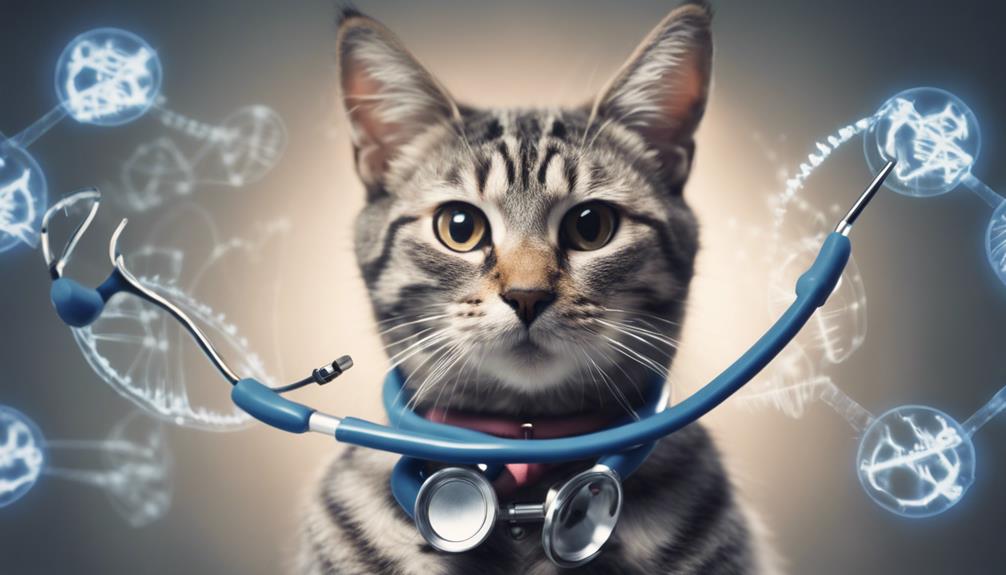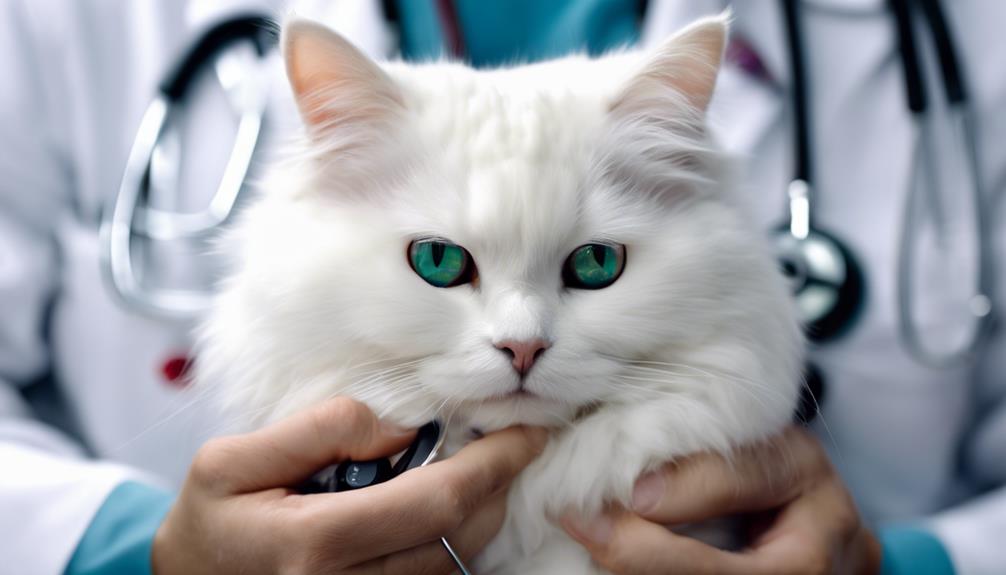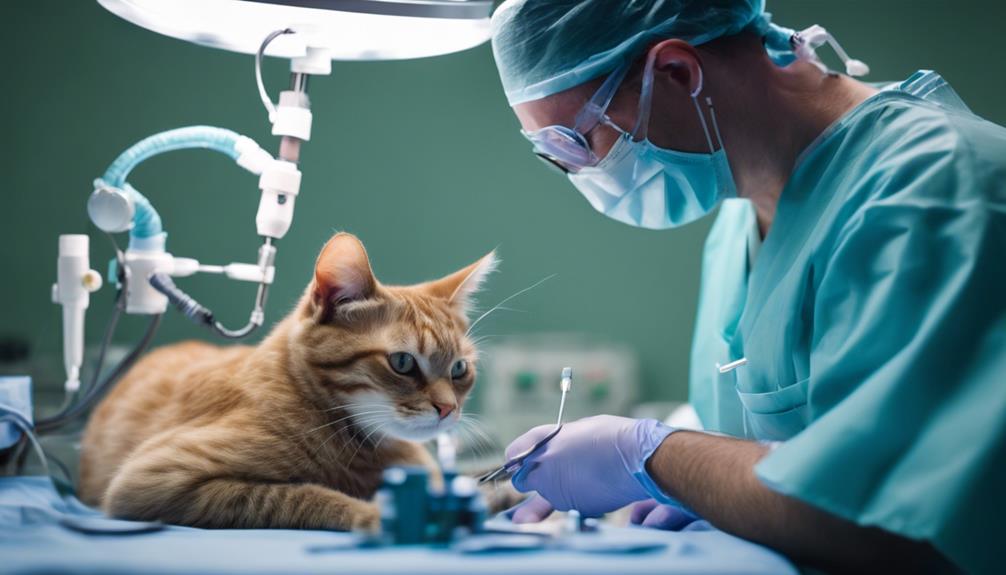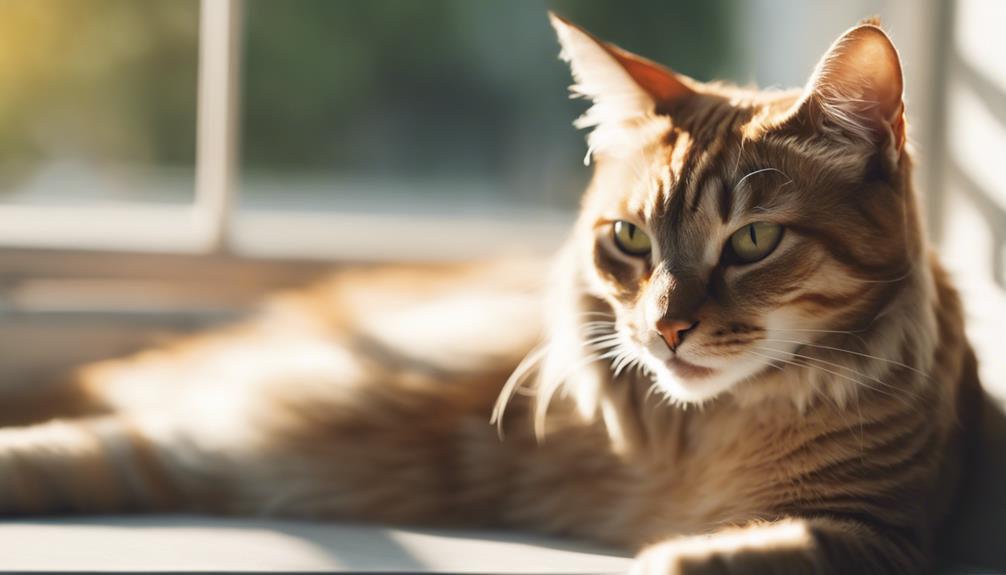When a veterinarian mentions the presence of a heart murmur in your cat, it unveils a realm of possibilities regarding your feline companion's cardiac health. This subtle yet significant finding can be indicative of various underlying conditions that necessitate further investigation and potential intervention.
Understanding the nuances of what a heart murmur might signify for your cat is crucial in ensuring their well-being and longevity. Stay tuned to unravel the mysteries surrounding feline heart murmurs and explore the implications they carry for your beloved pet's health.
Key Takeaways
- Heart murmurs in cats require early detection for effective management and improved quality of life.
- Structural abnormalities like Feline Hypertrophic Cardiomyopathy (HCM) can lead to heart murmurs.
- Symptoms like difficulty breathing and weakness may indicate underlying heart issues in cats.
- Regular vet check-ups and diagnostic tests are crucial for diagnosing and treating heart murmurs in cats.
Causes of Feline Heart Murmurs
Heart murmurs in cats can arise from various underlying causes. These include congenital heart defects, hypertension, hyperthyroidism, infections, and anemia. These conditions can lead to turbulent blood flow in the heart, resulting in abnormal sounds during heartbeat auscultation.
Congenital heart defects are present at birth and can impact the heart's structure and function. Hypertension, often linked to kidney disease in cats, can cause strain on the heart, leading to murmurs. Hyperthyroidism, a common endocrine disorder in older cats, can also contribute to heart murmur development. Infections affecting the heart muscle or valves and anemia, which reduces the blood's oxygen-carrying capacity, are additional factors that may lead to the presence of heart murmurs in feline patients.
Impact of Structural Abnormalities
Structural abnormalities, such as congenital heart defects and other cardiac complications, play a significant role in determining the impact of heart murmurs on feline patients. These abnormalities can vary in severity and have different implications for the overall health and quality of life of the cat. Understanding the specific structural issues present is crucial for guiding treatment and management strategies.
| Structural Abnormality | Impact on Cat | Treatment Options |
|---|---|---|
| Congenital Heart Defects | Can lead to heart failure | Surgery, medication |
| Cardiomyopathies | Increased risk of complications | Medication, lifestyle changes |
| Valvular Abnormalities | Altered blood flow patterns | Medication, monitoring |
Genetic Factors and Heart Murmurs

Genetic predispositions play a significant role in the development of heart murmurs in feline patients. Certain cat breeds, such as Maine Coons and Ragdolls, are more prone to inherit heart conditions like Feline Hypertrophic Cardiomyopathy (HCM) which can lead to murmurs.
These genetic factors can increase the likelihood of structural abnormalities in the heart, causing turbulent blood flow and the audible murmur sound during a vet exam. While not all heart murmurs in cats are solely due to genetic factors, it is essential to consider the potential hereditary component when diagnosing and managing heart conditions.
Understanding the genetic predispositions in specific breeds can help veterinarians provide targeted care and early interventions to improve the quality of life for feline patients.
Symptoms of Heart Murmurs in Cats
In feline patients, recognizing the symptoms associated with heart murmurs is crucial for early identification and appropriate management of potential underlying health issues.
When it comes to heart murmurs in cats, there are key signs to watch out for:
- Difficulty breathing
- Weakness
- Collapse
- Leg issues
These symptoms could indicate underlying heart problems that require prompt veterinary attention.
Monitoring your cat's behavior and seeking veterinary care if any of these signs manifest can help in addressing heart murmurs effectively and ensuring your feline companion's well-being.
Diagnostic Tools for Heart Murmurs

Diagnostic tools for heart murmurs in cats play a vital role in accurately assessing and monitoring feline cardiac health. Veterinarians utilize various diagnostic tests to evaluate the severity and underlying causes of heart murmurs. These tools include:
- Stethoscopes for initial detection
- Echocardiograms to visualize the heart's structure and function
- Blood tests to assess cardiac enzymes
- X-rays to evaluate heart size
- Electrocardiograms to analyze the heart's electrical activity
Through these diagnostic methods, veterinarians can identify issues such as heart enlargement and rhythm abnormalities, aiding in the proper management and treatment of feline heart murmurs.
Regular monitoring and thorough testing are essential for ensuring the best possible care for cats with cardiac concerns.
Treatment Options for Heart Murmurs
When addressing heart murmurs in cats, various treatment options are available to manage and improve feline cardiac health. These options include:
- Medications: Such as beta-blockers can help regulate heart function.
- Dietary Changes: Specific diets low in sodium can aid in reducing fluid retention and supporting heart health.
- Lifestyle Adjustments: Ensuring a stress-free environment and regular exercise can benefit overall heart function.
- Regular Monitoring: Follow-up appointments with the vet are essential to track progress and adjust treatment plans accordingly.
Surgical Interventions for Heart Murmurs

Utilizing advanced surgical techniques, veterinarians can offer effective interventions to address heart murmurs in cats, aiming to enhance cardiac function and improve feline well-being. These surgical interventions may be recommended in cases where medication or other treatments have not provided sufficient relief or in situations where there are congenital heart defects that require correction. Below is a table outlining some common surgical interventions for heart murmurs in cats:
| Surgical Intervention | Description | Benefits |
|---|---|---|
| Pacemaker Implantation | Electrical device to regulate heart rhythm | Improves heart function and quality of life |
| Valve Repair/Replacement | Corrects faulty heart valves | Restores proper blood flow and cardiac function |
| PDA Ligation | Closes abnormal blood vessel | Improves heart efficiency and circulation |
Importance of Early Detection
Early detection of heart murmurs in cats is crucial for timely intervention and enhanced management of feline cardiac health. Detecting murmurs early can lead to better outcomes and improved quality of life for your furry friend. Here are some key points highlighting the importance of early detection:
- Timely Treatment: Catching heart murmurs early allows for prompt treatment and monitoring.
- Prevention of Complications: Early detection can help prevent potential complications associated with advanced heart conditions.
- Improved Prognosis: Identifying murmurs at an early stage can lead to a better prognosis and increased life expectancy.
- Enhanced Quality of Life: Early intervention can significantly enhance your cat's overall quality of life and well-being.
Managing Heart Murmurs in Cats

The effective management of heart murmurs in cats plays a crucial role in ensuring optimal cardiac health and well-being for feline companions. Upon diagnosis, treatment options like medications such as beta-blockers and dietary modifications are often recommended. Regular monitoring by a veterinarian is essential to track the progress of the condition and make any necessary adjustments to the treatment plan.
In cases of congenital heart defects, surgery may be a viable option. Lifestyle changes, including stress reduction and maintaining a healthy weight, can also contribute to the successful management of heart murmurs in cats. By actively participating in the care and treatment of a cat with a heart murmur, pet owners can help improve their beloved feline's quality of life and potentially extend their lifespan.
Prognosis and Life Expectancy
Upon diagnosis of heart murmurs in cats, understanding the prognosis and life expectancy becomes paramount for informed decision-making and effective management strategies. It is essential to consider the following points:
- Varies by Underlying Cause: Prognosis depends on the underlying cause of the heart murmur.
- Regular Monitoring is Key: Regular veterinary check-ups and monitoring can help in assessing the progression of the condition.
- Treatment Impacts Life Expectancy: Proper treatment and management can significantly impact the cat's life expectancy.
- Quality of Life Matters: Focusing on maintaining a good quality of life for the cat is crucial in managing heart murmurs effectively.
Long-Term Care for Feline Heart Health

Effective long-term care for feline heart health involves regular monitoring and proactive management strategies to ensure optimal well-being. Regular veterinary check-ups are essential to monitor heart health, assess medication efficacy, and detect any changes in your cat's condition. Compliance with prescribed medications, such as beta-blockers, and maintaining a heart-healthy diet are crucial for managing heart murmurs.
Additionally, creating a stress-free environment, engaging in low-impact activities, and ensuring a balanced lifestyle can support your cat's heart health. Observing any changes in behavior, appetite, or activity levels and promptly reporting them to your veterinarian is key to addressing potential issues early.
Frequently Asked Questions
Can Heart Murmurs in Cats Be Completely Cured With Treatment, or Is It a Lifelong Condition That Requires Ongoing Management?
Heart murmurs in cats are typically a lifelong condition that requires ongoing management. While treatment can improve symptoms and quality of life, complete cure is rare. Regular vet check-ups, medication, and lifestyle adjustments are crucial for long-term care.
Are There Any Alternative or Holistic Treatment Options Available for Managing Heart Murmurs in Cats, in Addition to Traditional Medications?
Exploring alternative or holistic treatments for managing heart murmurs in cats beyond conventional medications is an evolving area. While holistic options like acupuncture or herbal remedies might show promise, consult with a vet to ensure safe and effective care.
How Can a Cat Owner Best Support Their Pet's Heart Health at Home, Beyond Just Following the Vet's Prescribed Treatment Plan?
Support your cat's heart health at home by maintaining a stress-free environment, providing a balanced diet, ensuring regular exercise, and administering medications as prescribed by the vet. Monitor behavior for signs of distress and follow-up with veterinary check-ups.
Are There Any Specific Breeds of Cats That Are More Prone to Developing Heart Murmurs, and if So, Are There Any Preventative Measures That Can Be Taken for These Breeds?
Certain cat breeds, like Maine Coons, Ragdolls, and Persians, are more prone to developing heart murmurs due to genetic predispositions. Preventative measures involve regular vet check-ups, early detection, and tailored care plans to manage potential cardiac issues effectively.
How Does a Cat's Age and Overall Health Status Impact the Prognosis and Treatment Plan for Heart Murmurs, Especially in Older Cats or Those With Pre-Existing Conditions?
The prognosis and treatment plan for heart murmurs in cats are influenced by age and overall health status. Older cats or those with pre-existing conditions may require tailored medication, monitoring, and lifestyle adjustments to manage heart murmurs effectively.
Conclusion
In conclusion, feline heart murmurs can be indicative of underlying cardiac conditions, often stemming from structural abnormalities or genetic factors. Timely detection and management of heart murmurs are crucial for ensuring the well-being of cats.
By understanding the causes, symptoms, diagnostic procedures, and treatment modalities associated with heart murmurs, pet owners can take proactive steps to safeguard their beloved feline companions' health and longevity. Early intervention is key in managing these cardiac anomalies effectively.




